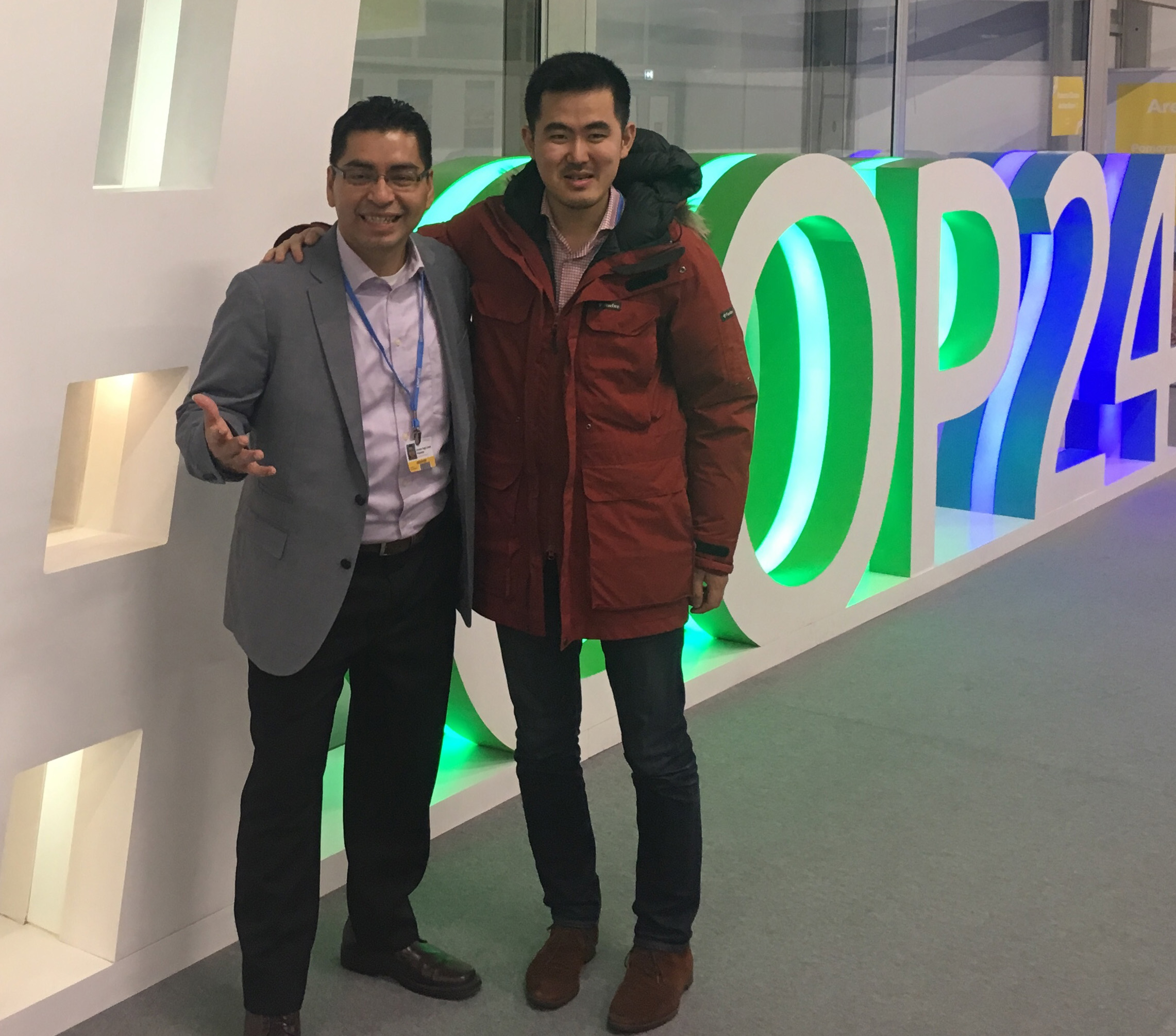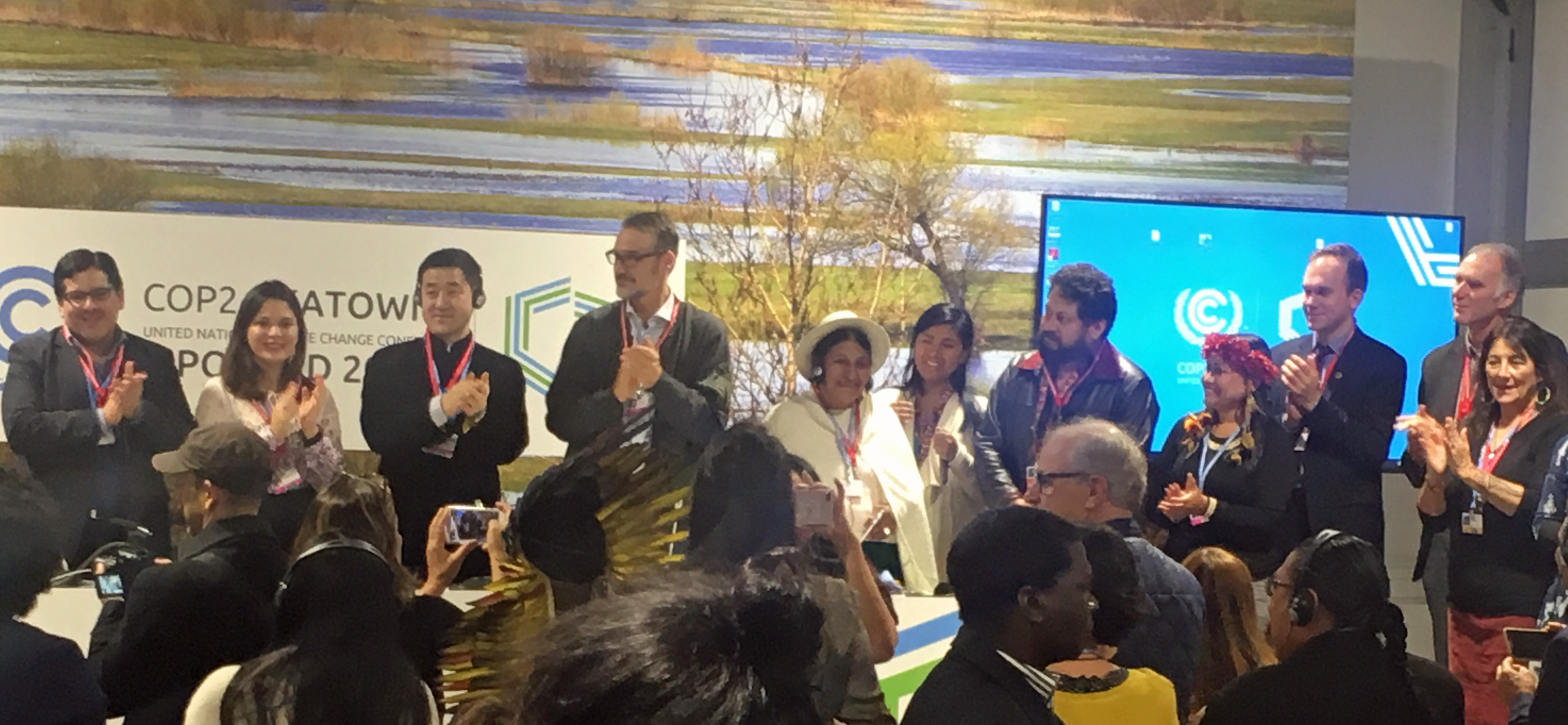
Written by Tomohiro Harada, PhD Fellow, Noragric
This last week 30,000 people from across the world gathered at the heart of Europe’s coal mining region to address the biggest threat to humanity: the adverse effects of climate change. During the first week at COP24 in Katowice, I followed the footsteps of Indigenous Peoples at the frontline of diplomacy at the Climate Change Summit. Three years after Paris, the Parties and Indigenous Peoples came to a consensus on the draft text for the operationalization of the Local Communities and Indigenous Peoples Platform (LCIPP). It is the first milestone for the establishment of a partnership between Indigenous Peoples and the Parties under the United Nations Framework Convention on Climate Change (UNFCCC). The agreement offers a glimmer of hope for Indigenous Peoples around the world, who because of their livelihoods are often the first to experience the worst consequences of the radical shifts taking place in the environment. However, as nothing is decided until everything is decided, Indigenous Peoples remain concerned about the declining “Spirit of Paris” as COP24 enters its final rounds of negotiation.
At the frontlines of climate change
Indigenous Peoples are at the frontlines of climate change. From day one of the COP negotiations, Indigenous Peoples Organisations representing their respective communities have participated in the plenaries, informal consultations, side-events and press conferences at the event. They have also been able to enter a dialogue with the COP Presidency on how they are affected by climate change. One indigenous youth representative from the Pacific gave an account of how her community will be under water within her lifetime because of the rising sea level. Another from the Arctic conveyed fear for his life and community as he described how the melting permafrost has made his land increasingly dangerous and unsuitable for traditional use. Youth participation at Climate Change Summits has grown in recent years, and indigenous youths are no exception. At COP24, all these youths argue that their future is at stake and that immediate actions are necessary to address the adverse effects of climate change.
The Indigenous Peoples Caucus at COP, represented by International Indigenous Peoples Forum on Climate Change (IIPFCC), is one of the nine constituencies recognised by UNFCCC. There are 370 million Indigenous Peoples across 5,000 nations around the world, each with its own distinct language, culture, and social and political institution apart from mainstream society. They are united by a common cause to address historic inequities that have resulted in their communities being marginalised and victimised. In the context of climate change, Indigenous Peoples do not only stand at the frontline where they are most vulnerable to the changing climate, but they also offer solutions as they guard over 80% of the remaining biodiversity with knowledge and practices specific to their respective environments. Indigenous Peoples come to COP to make a unique contribution to ensure that climate actions are more effective, inclusive and just.
One of the most important processes for the Indigenous Peoples at COP24 has been to determine a new decision text for the operationalization of the Local Communities and Indigenous Peoples’ Platform. The Paris Agreement and Decision adopted at COP21 in Paris in 2015 (Decision 1/CP.21) acknowledges that “climate change is a common concern of human kind”, and that when the Parties take action to address climate change, they should respect, promote and consider their respective obligation on the rights of indigenous peoples. Having recognised the need to strengthen knowledge, technologies, and practices, the Paris Agreement established LCIPP to enable the exchange of experiences on mitigation and adaptation in a holistic and integrated manner.
At COP23 in Bonn in 2017, it was agreed that the LCIPP will have three main functions:
- Knowledge: Promoting the exchange of experiences and best practices
- Capacity building: Enabling local communities’ and indigenous peoples’ engagement in the UNFCC process
- Climate Change Policies and Actions: Facilitating the integration of diverse knowledge systems
Additionally, COP23 requested the establishment of a facilitative working group (FWG). The decision recommended that the four key principles proposed by Indigenous Peoples Organisations should be taken into account:
- Full and effective participation of indigenous peoples
- Equal status of indigenous peoples and Parties, including in leadership roles
- Self-selection of indigenous peoples representatives in accordance with indigenous peoples’ own procedures
- Adequate funding from the secretariat and voluntary contributions to enable the functions of LCIPP
I have been following this particular negotiation process, from various informal consultations and workshops in Helsinki in February, to Bonn in May, Cochabamba in October and now to Katowice.
The Spirit of Talanoa
The negotiation over the establishment of the FGW and operationalization of LCIPP has been a delicate process since the adoption of the Paris Agreement. There has been a great deal of diplomacy in all directions imaginable and Indigenous Peoples have worked in partnership with Parties, forging mutual understanding and respect, and perhaps most importantly in this case, friendship. Since COP23 in Bonn, it became customary for the Parties to invite Indigenous Peoples into the negotiation space and have their representatives participate in the drafting of the text, to ensure that they are part of this consensus building process.
As the days went by, the strict diplomatic protocol that governs Party consultations had given away to what some have called “the spirit of Talanoa”. Storytelling was an important part of this process. In articulating the necessity of the LCIPP and the Indigenous Peoples’ participation in addressing climate change, elders have often shared, in session, their vulnerabilities and how, in partnership with the Parties, their traditional knowledge can contribute to saving Mother Earth. During the break, many Indigenous Peoples, in the presence of several Party representatives, took to the floor to share their music, dance and traditional knowledge. It is important to mention here that, like any other consultation process under UNFCCC, negotiation was both a tough and delicate game. In Bonn in May and in Katowice, many Indigenous Peoples felt that they had reached a seemingly irreconcilable impasse. However, unlike any other Party Consultations, this particular one enabled the equal participation of the Parties and non-Party stakeholders (i.e. Indigenous Peoples), as they shared their stories without apportioning any blame.
It is in this spirit that we saw an evolving relationship among the Parties and Indigenous Peoples in the room. As a result, the notion of “friendly Parties” started to materialize, with more openness and inclusiveness. In Bonn in May, it seemed clear to many Indigenous Peoples which of the Parties posed the greatest challenges to drafting process of LCIPP. China, for instance, insisted that a language of “territorial integrity and political unity of sovereign and independent States” be used in the draft text. This was a language that was not acceptable to Indigenous Peoples and their supporters, including the EU, Canada and Norway. However, as the consultation continued, I witnessed an increasing interaction between Indigenous Peoples and “non-friendly Parties”. Their respective pains and desires became more contextualised through storytelling; China began to share their vulnerabilities and their vision of LCIPP through storytelling. This not only helped many in the room to understand exactly what their main concerns were, but also showed that China believes its traditional knowledge can contribute to LCIPP. What transpired in Cochabamba and Katowice is a transformative process where “friendship status” is no longer defined by common position, but by openness to dialogue and a prioritisation of inclusiveness. The day after the Indigenous Peoples and the Parties reached consensus on the text, the mood in the Indigenous Caucus was jubilant. Amazingly, in the middle of the Caucus, the Chinese negotiator has now become a friend of the Indigenous Peoples, even connecting through WhatsApp. According to the Indigenous COP veterans, this was an unprecedented event in the history of the Caucus.

The importance of storytelling
We have all learned, through the repeated interventions by Indigenous Peoples, the potential of not only traditional knowledge in addressing the adverse effects of climate change, but also storytelling as a way to relate, share vulnerabilities and potentials, and to build mutual trust and understanding. This unique process enables us to visualise how Indigenous Peoples can transform diplomacy when given the space, rights and recognition to share their stories in their own way. Through this practice, the consultation demonstrated a lot of promise as to what the FWG and LCIPP could be when they are fully operational. By carrying out diplomacy in accordance with the “Spirit of Talanoa” – the indigenous way of doing diplomacy – this consultation process was already beginning to perform the functions of the LCIPP.
Erasure of human rights and the rejection of the Special Report
When one zooms out from the LCIPP consultation to the rest of COP, however, a different impression is gained – “Spirit of Paris” and the “Spirit of Talanoa” has gone AWOL. For the last couple of days, we have started to see, one by one, the languages associated with rights-based climate action, including human rights, bracketed and erased from the drafted texts of the agenda items under Paris Rulebook. The weakening of the rights-based approach to climate action also dilutes the effectiveness of LCIPP, being based as it is on a respect for indigenous rights. Another big blow is that the Parties have failed to adopt the IPCC Special Report on 1.5 degrees released this October, following a series of objections mounted by the United States, Russia, Kuwait and Saudi Arabia who jointly refused to welcome the report at the plenary session. It is expected that the proponent Parties of this report will attempt to revive this discussion next week. However, time is running out. Without the IPCC Special Report on 1.5 degrees as a basis for further negotiation, the Paris Rulebook – should it be adopted – is bound to fall far too short of the recommendations of the IPCC Report, as well as the expectations set forth in the Paris Agreement.
So where does this leave the Indigenous Peoples for the remainder of COP24? Indeed, nothing is decided until everything is decided. The adoption of LCIPP still depends entirely on the outcome of the high-level segment, which is set to begin this week. Some see that it is already out of their hands. The conversations are highly technical and political and their resources are thin. An indigenous delegate commented:
Back home… they maybe don’t see climate change in terms of a rulebook. They maybe don’t see climate change in terms of specific little paragraphs with specific wordings… that can absolutely screw you over
Their stories are buried altogether by endless political bickering, an alphabet soup of acronyms, catch phrases and complicated concepts, which are completely devoid of any meaningful connection to those who stand at the frontline of climate change.
But they refuse to remain silent. In the Spirit of Talanoa, they continue to share stories about their mountains, rivers, forests and oceans in their own way and at every opportunity they can find.
The Indigenous Peoples’ fight continues because, as they proclaim, “we are still here”.
I wish to express thanks to Ghazali Ohorella, co-chair of the International Indigenous Peoples’ Forum on Climate Change, and to the many Indigenous Peoples who introduced me to the Caucus in the spirit of openness and friendship.
 Tomohiro Harada is a PhD Fellow at the Department of International Environment and Development Studies, focusing on indigenous diplomacies in global politics, specifically Sami diplomacies in global environmental politics.
Tomohiro Harada is a PhD Fellow at the Department of International Environment and Development Studies, focusing on indigenous diplomacies in global politics, specifically Sami diplomacies in global environmental politics.


